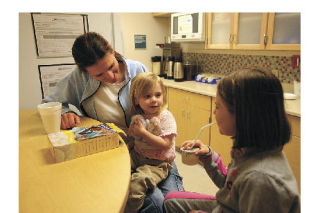Constipation in children can be frustrating and concerning for parents and kids. The Pediatric Gastroenterology Program at Mary Bridge Children’s Hospital and Health Center offers some helpful information for parents to better understand what causes it and what can be done to treat the condition.
Constipation is difficulty in passing stool or a longer-than-normal time between bowel movements. Symptoms can include less frequent bowel movements, hard or small feces or difficult or painful passage of a large stool. Most children with constipation do not have an underlying medical problem as a cause of their symptoms. Constipation is common in children and generally resolves with changes in diet, behavior and sometimes with medication.
The frequency of bowel movements and consistency of stool in infants and children depend upon their age and diet. The guidelines below describe the range of normal patterns, although an individual child’s pattern can vary.
What is it?
Constipation is a decrease in the number of bowel movements or when the consistency of the stool is dry or hard.
How often children usually pass a bowel movement varies from several times a day to one to two times a week without straining or discomfort.
The typical infant has two bowel movements a day while a child over 18 months of age usually passes one almost every day.
It is important to understand that even children with normal bowel movement frequency can still have symptoms of constipation.
Small, hard or rock-like stools passed daily, or very large, firm stools that clog the toilet once a week are all signs of constipation.
When does constipation begin?
Problems with constipation can begin at any age.
A change in diet such as beginning solid foods, illness, stress, toilet training, lack of exercise or not willing to stop playing in order to use the bathroom can all lead to difficulty passing bowel movements.
Constipation can also be a symptom of a disorder such as hypothyroidism, Hirschsprung’s disease, Celiac disease, spinal cord dysfunction or an adverse effect of some medications.
Infants less than six months of age can appear as if they are constipated because they may strain and act like they are having pain for several minutes, but then pass a soft bowel movement. This occurs because the muscles used are not yet coordinated.
What is stool withholding?
Withholding is the repetitive attempt to avoid going to the bathroom and is often due to the fear of experiencing pain. This behavior is common in children who have constipation.
In order to prevent passing a stool some children will cross their legs, stand rigidly upright, stiffen while laying down or hold onto furniture to tighten up the muscles in their bottom.
Some children do this voluntarily while others are not aware that they are trying to stop the passage of stool. Children will continue to withhold unless they pass easy and painless stools. Unfortunately, repeated withholding leads to hard bowel movements.
It can take several months before a child stops withholding stool.
Parents are often concerned that their infant is constipated because the infant appears to be straining during going to the bathroom. Because infants have weak abdominal muscles, they often strain during a bowel movement, causing the face to appear red. An infant is unlikely to be constipated if he or she passes soft stools within a few minutes of straining.
What causes constipation?
The longer the stool stays in the colon the harder and drier it becomes. This occurs because the colon or large intestine acts like a sponge, removing fluid from the stool before it leaves the body.
The stool usually becomes large and will stretch out the colon. Once it becomes stretched, it is difficult for the stool to move through the colon and out of the body.
It can take months for the colon to return to its normal size. Normal bowel movements need to be passed at least every other day for this to occur.
Many children with constipation develop unusual habits when they feel the urge to have a bowel movement. Infants may arch their back, tighten their buttocks and cry. Toddlers may rock back and forth while stiffening their buttocks and legs, arch their back and wriggle or fidget, or they may squat or get into other unusual positions. Many children hide in a corner or some other special place while doing these distinctive actions.
What is the treatment
for constipation?
Treatment is based on the severity of constipation.
Medications given by mouth and/or by suppository help soften the stool to make it easier for the child to go to the bathroom.
In addition, dietary changes and behavior modification are helpful.
Toilet training should not be attempted until after the constipation has resolved.
If you are concerned that you child may have constipation, consult your pediatrician before starting any treatment.
For more information on the services provided at Mary Bridge Children’s Hospital and Health Center or Mary Bridge Pediatric Care at Good Samaritan Hospital, visit multicare.org.
About the Providers
Daniel Lustig, MD, is a pediatric gastroenterologist with Mary Bridge Children’s Hospital & Health Center. He is a graduate of University of South Dakota School of Medicine. Dr. Lustig completed his pediatrics residency at Eastern Carolina University and a fellowship in pediatric gastroenterology at Vanderbilt University Medical Center.
Lisa Philichi, ARNP, is a pediatric nurse practitioner at Mary Bridge with special training in pediatric gastroenterology. She received her Master’s in Nursing from University of California, Los Angeles and her pediatric nurse practitioner certification from the University of Washington.
MultiCare’s Mary Bridge Children’s Hospital & Health Center in Tacoma partners with local providers and community hospitals as a regional referral center for pediatric specialty care. Mary Bridge outreach clinics are also located in Puyallup, Covington, Gig Harbor, Olympia and Silverdale serving families closer to home.


